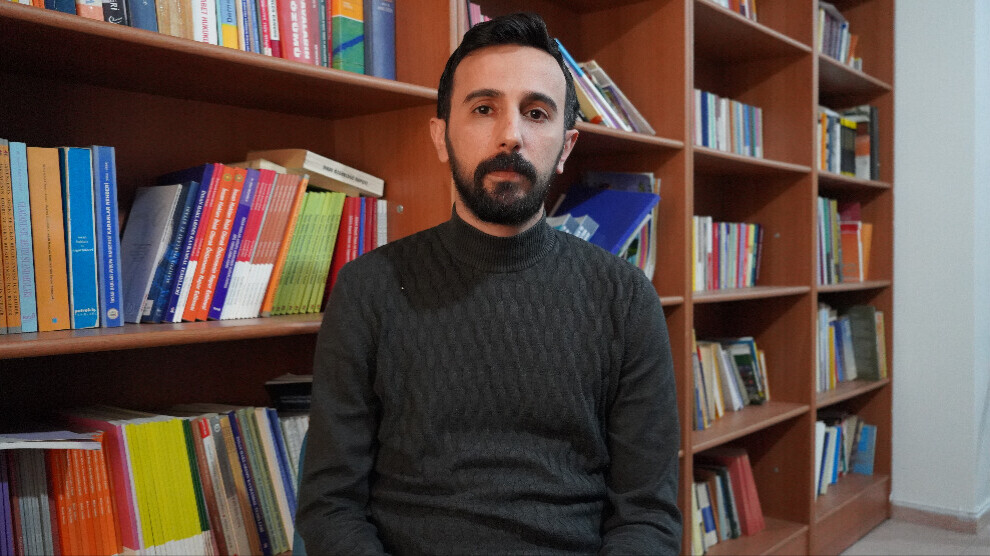Lawyer Erdoğan: The issue of ill prisoners must be solved
Lawyer Yusuf Erdoğan called for an urgent solution to the unlawful detention of ill prisoners.
Lawyer Yusuf Erdoğan called for an urgent solution to the unlawful detention of ill prisoners.

The condition of ill prisoners remains a pressing concern. Despite having received medical reports declaring them unfit to remain in prison, many continue to be held behind bars and are effectively left to die.
Yusuf Erdoğan, co-spokesperson of the Central Prisons Commission of the Human Rights Association (IHD), told ANF that this issue was also a matter of public debate during the 2013–2015 peace process. He said: "We believe that the issue of sick prisoners should not be addressed only during specific periods. For us, as human rights defenders, civil society organisations, and legal professionals, it is a matter that must remain constantly on the agenda and be resolved."
Physical and psychological conditions are not suitable
Lawyer Erdoğan highlighted that the physical and psychological conditions of Turkish prisons are not suitable for sick prisoners. Erdoğan said: "It is not possible for a person who enters prison in Turkey to complete their sentence in good health. Especially after the construction of F-Type High Security Prisons, the entire prison regime in Turkey was transformed. With this transformation, many new types of prisons were introduced. The physical structure of these new facilities has directly contributed to the worsening health of prisoners. We see that prisons in Turkey are overcrowded and many people are kept in cramped rooms. In these new types of prisons, detainees are confined to very small cells. Prisoners are forced to live in narrow spaces that are not compatible with human dignity. These physical conditions cause both physical and psychological illnesses in prisoners."
They are built on a system of isolation
Lawyer Erdoğan noted that prisons in Turkey are constructed according to an isolation-based system. He continued: "S-Type and Y-Type high-security prisons are facilities where prisoners are kept in complete isolation from one another. This isolation negatively affects prisoners both physically and psychologically. They do not feel safe, and because they are unable to communicate with other inmates, they suffer from serious psychological problems. In addition, according to reports by the IHD and other civil society organisations, incidents of torture and ill-treatment are occurring in many prisons."
The right to access healthcare
Yusuf Erdoğan stated that one of the most pressing issues for sick prisoners is their limited access to healthcare services. He said: "There are serious obstacles at every stage, from access to the infirmary to transfers to hospitals. In many prisons, sick prisoners are also not guaranteed access to a healthy and balanced diet.This situation makes their lives even more difficult.” Erdoğan also drew attention to R-Type prisons, officially known as rehabilitation centres. He explained, “There are only three of these prisons built for sick inmates. The state presents them as a solution; however, our field observations contradict this claim. In the R-Type prisons we visited, we received numerous complaints indicating that prisoners were not receiving the medical treatment they needed. As the IHD, we have conducted visits to all three R-Type facilities and published reports. These reports clearly show that the current physical conditions do not meet the needs of sick prisoners."
Sick prisoners are being left to die
Lawyer Erdoğan also drew attention to the reports issued by the Forensic Medicine Institute (ATK) and to Law No. 5275 on the Execution of Sentences and Security Measures. He stated: "The ATK often disregards medical reports issued by fully equipped hospitals declaring that a prisoner is unfit to remain in prison. Instead, it issues reports claiming the prisoner can remain incarcerated. In many cases, these decisions are soon followed by the prisoner’s death in prison. We do not believe that the ATK is an impartial or independent body. In our view, reports from fully equipped public hospitals should be considered sufficient.
Ill prisoners must be released without condition. Law No. 5275 is also a significant obstacle. Even when the ATK issues a favourable report, enforcement prosecutors or law enforcement officers may block the release, citing 'public security' as a justification. The government treats sick prisoners with a mindset of revenge or as political hostages. This is unacceptable. The issue of sick prisoners cannot be treated as a matter of political bargaining. As discussions of peace and negotiation processes take place, this problem must be resolved immediately."